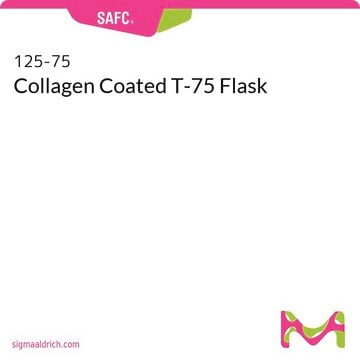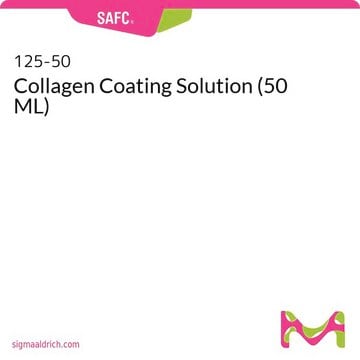CC337
CytoSoft®T-75 Flasks
Elastic Moduli 0.2 kPa
Synonyme(s) :
T75 cell culture flask
About This Item
Produits recommandés
Niveau de qualité
Conditionnement
flask of 6 ea
Technique(s)
cell culture | mammalian: suitable
Température de stockage
room temp
Vous recherchez des produits similaires ? Visite Guide de comparaison des produits
Description générale
Coating Procedure
Note: Use these recommendations as guidelines to determine the optimal coating conditions for your culture system. The bottom of the plate can be detached by excessive mechanical force such as centrifugation or direct contact with liquid handling tools (tips, pipettes, etc.).
1. Remove the CytoSoft® product from the protective sleeve in a sterile hood.
2. Prepare extracellular matrix material by neutralizing in amine-free buffer pH 7.4 to 7.9 (such as 1X DPBS). We do not recommend using gelatin as your ECM protein. Note: Pre-warm the coating solution to approximately room temperature before use.
3. Dilute as needed, and dispense 30 mL of solution into each well to coat the surface. Note: Recommended dilution for PureCol™ Type I collagen is 1:30 (~100 µg/ml). Note: The hydrophobic surface requires larger volumes to cover the surface than do conventional plastic dishes
4. Incubate ECM coated CytoSoft® at room temperature, covered for 1 hour.
5. After incubation, aspirate any remaining material and rinse coated surfaces immediately two times with culture medium or PBS. Leave about 5-10 mL of medium per well to keep surface covered. Note: Do not allow the CytoSoft® surface to become dry once the surface has been wetted.
6. Coated surfaces are ready for use. Standard harvesting procedures used for removing cells from cultureware can be employed for harvesting cells from the CytoSoft® product including use of trypsin, Accutase® and non-enzymatic cell detachment solutions.
The rigidity of the substrate to which cells adhere can have a profound effect on cell morphology and gene expression. CytoSoft® products provide a tool to culture cells on substrates with various rigidities covering a broad physiological range. On the bottom of each flask, there is a thin layer of specially formulated biocompatible silicone, whose elastic modulus (rigidity) is carefully measured and certified. The surfaces of the gels in CytoSoft® products are functionalized to form covalent bonds with amines on proteins. This chemical functionalization is stable and the reaction does not require a catalyst, facilitating the coating of the gel surfaces with matrix proteins and plating cells.
The silicone substrates of CytoSoft® products are optically clear and have a low auto-florescence. The layer of silicone in each flask is firmly bonded to the bottom of the flask. Unlike hydrogels (such as polyacrylamide gels), silicone gels are not susceptible to hydrolysis, do not dry nor swell, are resilient and resistant to tearing or cracking, and their elastic moduli (rigidities) remain nearly unchanged during extended storage periods.
CytoSoft® products accommodate the harvesting of cells using enzymes such as trypsin and collagenase. There is no biochemical breakdown of the substrate during or after enzyme treatment, and there are no residuals of the substrate in the sample retrieved from a CytoSoft® plate.
Application
Sterility: Ozone
Cell attachment: Tested
Cell growth: Tested
Stockage et stabilité
Autres remarques
Informations légales
Clause de non-responsabilité
Code de la classe de stockage
13 - Non Combustible Solids
Classe de danger pour l'eau (WGK)
WGK 3
Point d'éclair (°F)
Not applicable
Point d'éclair (°C)
Not applicable
Certificats d'analyse (COA)
Recherchez un Certificats d'analyse (COA) en saisissant le numéro de lot du produit. Les numéros de lot figurent sur l'étiquette du produit après les mots "Lot" ou "Batch".
Déjà en possession de ce produit ?
Retrouvez la documentation relative aux produits que vous avez récemment achetés dans la Bibliothèque de documents.
Articles
CytoSoft® modulus plates analyze substrate stiffness effects on cell behavior across a physiological range for mechanobiology research.
CytoSoft® modulus plates analyze substrate stiffness effects on cell behavior across a physiological range for mechanobiology research.
CytoSoft® modulus plates analyze substrate stiffness effects on cell behavior across a physiological range for mechanobiology research.
CytoSoft® modulus plates analyze substrate stiffness effects on cell behavior across a physiological range for mechanobiology research.
Notre équipe de scientifiques dispose d'une expérience dans tous les secteurs de la recherche, notamment en sciences de la vie, science des matériaux, synthèse chimique, chromatographie, analyse et dans de nombreux autres domaines..
Contacter notre Service technique






